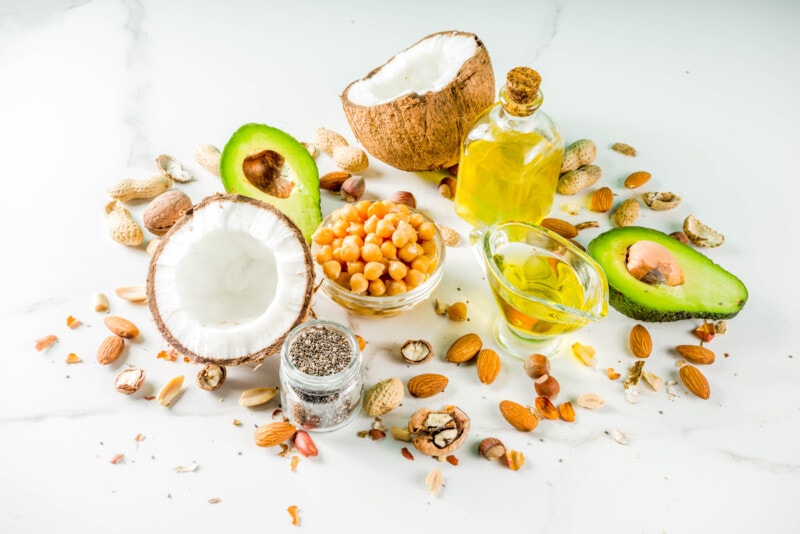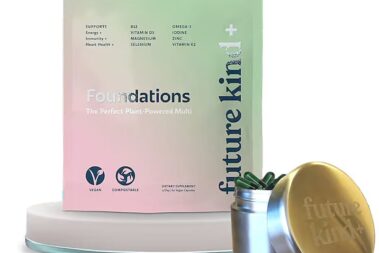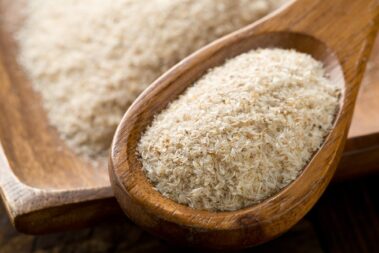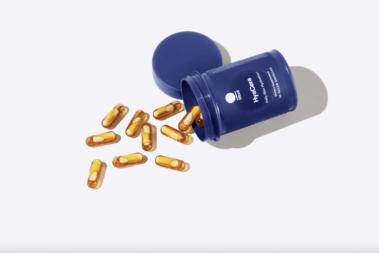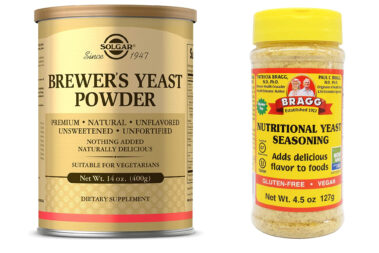It’s easy to keep your calorie intake in check when you eat a plant-based diet. Without refined oils and processed food in the mix, most vegan food sources are fairly low in calories. While this is great in many respects, it does mean you have to pay attention in order to assure you’re getting enough fat in your diet.
If you’re looking for some easy ways to incorporate healthy vegan fat sources into your routine, we’ve got the list for you. Below, you’ll find 9 healthy sources of plant-based fat as well as information on what makes them healthy and how much of them you should eat.
Table of Contents
Is There Such a Thing as Healthy Fat?
Fats have certainly gotten a bad rap in American culture. But the truth is, our bodies need fat to function. In fact, nearly 60% of our brains are made of fat (1)!
Without enough fat in your diet, your body will suffer from neurological problems, skin issues, a suppressed immune system, and certain vitamin deficiencies. But this doesn’t mean that all fats are created equal. When striving for optimal health, there are only certain types of fat you should try to include in your daily intake.
Monounsaturated Fats
Monounsaturated fats (MUFAs) are those that have only a single unsaturated carbon bond. This unique, structure allows them to aid in many cellular processes without leading to weight gain.
MUFAs help with vitamin absorption, lower high-density lipoprotein levels (bad cholesterol), and help support overall cell health. Diets high in MUFAs have been found to reduce the risk of cardiovascular disease and stroke, and can help lower blood pressure(2).
This type of fat is found in many plant products and makes up a lesser percentage of overall fat in some animal products.
MUFAs are beneficial and should be consumed daily.
Polyunsaturated Fats
Polyunsaturated fats contain multiple unsaturated carbon bonds. Like MUFAs they are vital to many cellular processes and are used primarily in energy production rather than fat storage.
Essential fatty acids, including omega-6 fatty acid and omega-3 fatty acid, are polyunsaturated fats. These fats, which cannot be created by the body, are necessary for DNA replication and the creation of cellular membranes. Most notably, they play a key role in making the hormones responsible for relaxation, contraction, and inflammation control of cardiovascular tissue(3).
Needless to say, they are vital for both heart and overall health. These fats are plentiful in the plant kingdom as well as in many species of fish.
Polyunsaturated fats are beneficial and should be consumed daily.
Saturated Fats
Saturated fats are made up of long chains of carbon atoms that are saturated with hydrogen. These molecules are used for energy as well as energy storage and can cause weight gain if consumed in higher than necessary amounts.
Saturated fats also seem to have a negative effect on overall cholesterol levels, though whether they directly contribute to cholesterol or simply fail to reduce the levels the way healthier fats do is still not well understood.
In either case, dieticians and cardiac specialists tend to agree that it is best to keep your saturated fat intake down. These unhealthy fats are found mostly in animal foods, including meat, dairy, and eggs.
Saturated fats have either a neutral or negative impact on health and should only be consumed in moderation.
Medium Chain Triglycerides
Medium-chain triglycerides (MCTs) are a special kind of saturated fat that contains only 6 to 10 carbon atoms. These differ in structure and use compared to most saturated dietary fats, which are made up primarily of long-chain and very-long-chain molecules.
The unique structure of MCTs means they are relatively water soluble and are therefore rapidly hydrolyzed and absorbed into the body. Because of this, they tend to be used primarily for energy metabolism and not fat storage.
Studies have shown that including MCTs in the diet can help people lose weight through appetite reduction, increased energy production, and fat oxidation(4). MCTs are found almost exclusively in coconuts, palm nuts, dairy, and human breast milk.
MCTs have a positive effect on weight loss and can be consumed daily.
Trans Fats
Trans fats are unsaturated fats that contain trans double bonds instead of cis double bonds. Dietarily, these partially hydrogenated oils increase bad cholesterol (high-density lipoprotein) while simultaneously decreasing good cholesterol (low-density lipoprotein). Because of this, they can increase a person’s risk of cardiovascular disease(5).
Trans fats are naturally occurring in small amounts in certain meats and dairy products. But the vast majority of trans fats are artificial and added to vegetable oils to make them solid at room temperature.
Trans fats have only a negative impact on health and should be avoided.
Sources of Healthy Vegan Fat
If you eat a plant-based, vegan diet, then it is easy to eat plenty of mono and polyunsaturated fats, as well as MCTs, without exposing yourself to high amounts of saturated fats or trans fats.
Here are nine of the healthiest high-fat vegan foods.
1. Seeds

Fat Type: Unsaturated fats including omega-3 fatty acids
How Much to Eat: About 2 tablespoons per day
Seeds are nutrient and calorie-dense foods that have a number of health benefits. When it comes to healthy fats, in particular, chia, flax, and hemp seeds are the best choices.
Each of these seeds contains plenty of omega-fatty acids, particularly alpha-linolenic acid (ALA). ALA is used by the body to create docosahexaenoic acid (DHA) and eicosapentaenoic acid (EPA). Both of these are important omega-3 fatty acids utilized in many cellular processes.
To get the most benefit from chia seeds, flax seeds, and hemp seeds, grind them in a coffee grinder before use. This will make the fats inside more biologically available to your system. Seed butter is also an excellent source of healthy fats.
2. Nuts

Fat Type: Mostly polyunsaturated and monounsaturated fats
How Much to Eat: About 1 ounce per day
Nuts are another nutrient and calorie-dense vegan staple that are loaded with good fats. Your typical nut contains mostly polyunsaturated fats with some monounsaturated fats, and trace amounts of saturated fats.
Walnuts are an especially good source of ALA. Almonds, pistachios, cashews, and other tree nuts also make good options. Peanuts, which are actually a type of legume, have a similar fat profile to true nuts and are loaded with protein.
When choosing nuts to snack on, look for raw, unsalted varieties. Raw nut butters are also a healthy source of fat.
3. Avocados
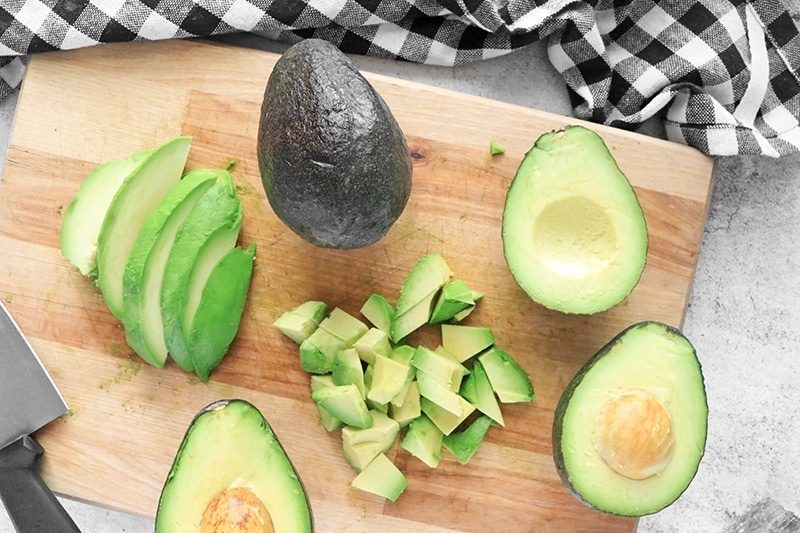
Fat Type: Mostly monounsaturated fat
How Much to Eat: ½ to 1 avocado per day
Most fruits are very low in fat. The avocado is one clear exception. This creamy fruit has about twice as much fat in it as it does carbohydrates. This fat is made up of about 70% monounsaturated, 18% polyunsaturated, and 12% saturated.
This calorie-dense fruit is a great way to fill up to prevent overeating. Plus, avocados are packed with helpful antioxidants.
Some of our favorite ways to use avocados include:
4. Olives
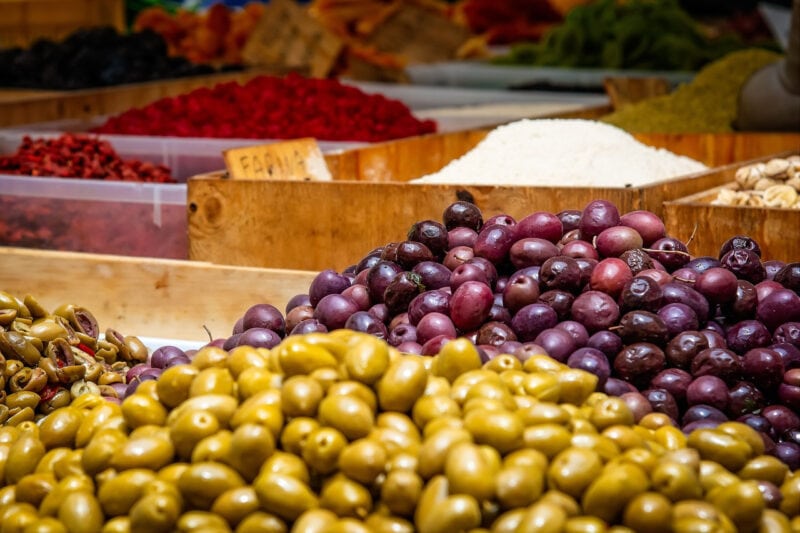
Fat Type: Mostly monounsaturated fats
How Much to Eat: 2 to 3 ounces
When people think of healthy fats, their minds often go to olive oil, forgetting that olives in their whole form have just as much—if not more—to offer. Like the oil, olives are packed with monounsaturated fat, particularly oleic acid.
Oleic acid has been proven to reduce the risk of heart disease, lower cholesterol, and boost brain function. It may also play a role in preventing immune dysfunction, reducing the effects of inflammatory disease, and reducing the spread of certain infectious diseases(6).
In addition to fat, whole olives also contain plenty of fiber, minerals, and vitamins. Olives make delicious snacks on their own and are also a key feature in some of our favorite recipes, including:
5. Soy

Fat Type: Polyunsaturated and monounsaturated fats
How Much to Eat: 50 to 70g of soybeans per day
Soy is often celebrated for its plant-based protein content, but these legumes are also loaded with healthy fats. Soybeans get about 40% of their caloric content from fat, mostly polyunsaturated and monounsaturated varieties. Like olives and chocolate, they are a rich source of oleic acid and also contain tons of linoleic acid(7).
But before you go chowing down on every soy product you can find, keep in mind that most soy-based foods utilize soy protein only. This means they contain much of the soybean’s great protein content, but not much of their fat.
To get the full benefits of this bean, we recommend making edamame, tempeh, and other whole soybean foods a part of your daily routine.
6. Algal Oil
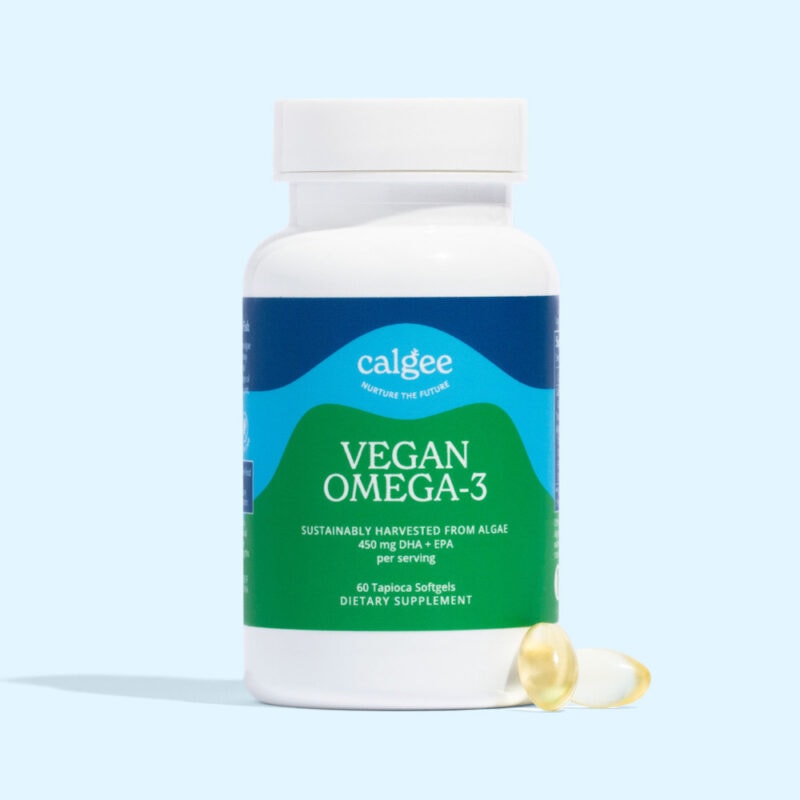
Fat Type: Omega-fatty acids
How Much to Eat: 2g per day
More supplement than food, algal oil still deserves a place on this list. That’s because this fish-oil alternative is packed with omega-fatty acids. Most specifically, it represents one of the best plant-based foods for EPA and DHA.
These omega-3 fats are important for brain, immune, eye, and heart function. They are also incredibly important for maintaining an appropriate inflammatory response.
Many vegans are deficient in omega-3 fatty acids. Using an vegan Omega-3 oil supplement is a great way to ensure you’re getting enough of these healthy fats without having to turn to fish oil products that are threatening the health of our oceans.
7. Cocoa
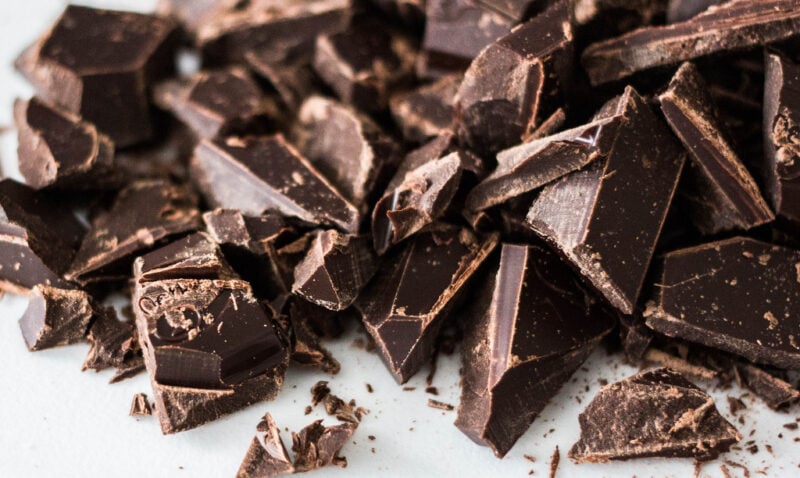
Fat Type: Saturated and monounsaturated fat
How Much to Eat: 1 to 2 ounces per day
Cocoa butter, which is used to make dark chocolate, comprises the fat-rich part of the cocoa bean. The fat content of cocoa is about ⅔ saturated fat and ⅓ oleic acid, the same type of monounsaturated fat that gives olive oil its health benefits.
While cocoa is high in saturated fat, many of the possible negative effects of this kind of fat are offset by the oleic acid, antioxidants, and flavonoids present in chocolate(8). (If you want these health boosters without the added calories, use cocoa powder instead, which contains very little cocoa butter, but plenty of healthy phytochemicals and fiber).
When eating chocolate for its health benefits, stick to products with at least 75% cocoa and remember that more is not better in this particular case.
8. Coconut
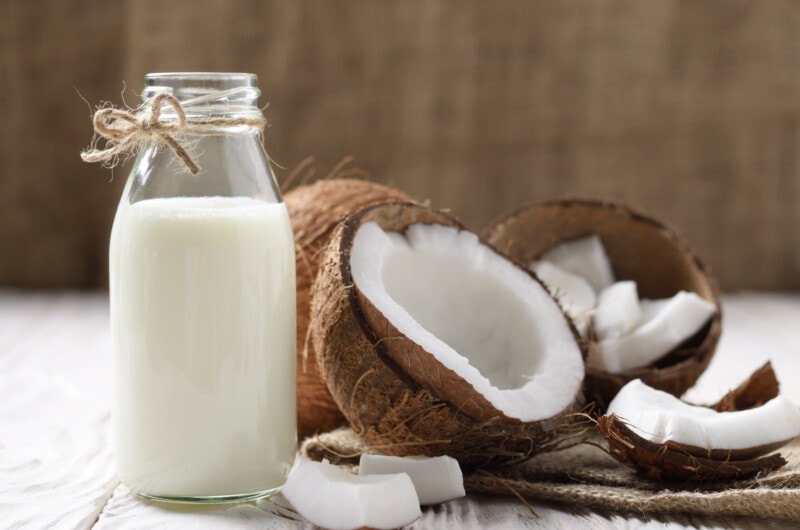
Fat Type: MCT
How Much to Eat: 2 tablespoons
There are few vegan fat sources more celebrated than coconut oil. But, in terms of scientific backing, many of these claims are still waiting for the research to catch up. But one thing we do know about coconuts and coconut products is they are high in medium chain triglycerides.
And the science on MCTs is pretty clear, as we discussed above. Adding coconut oil to your diet, especially as a replacement for butter on toast or an additive to your morning smoothie, can help you shed weight(9).
But, keep in mind, the MCT content of coconut oil is only about 54%, which means the rest of the fat is longer-chain saturated fat. Since this fat should be limited, it’s best not to go overboard with coconut oil.
Note on palm oil: Palm oil is also a good source of MCT. Unfortunately, much palm oil production is done irresponsibly with high environmental impact. Whether you are enjoying palm or coconut oil, be sure it is responsibly sourced.
9. Olive Oil
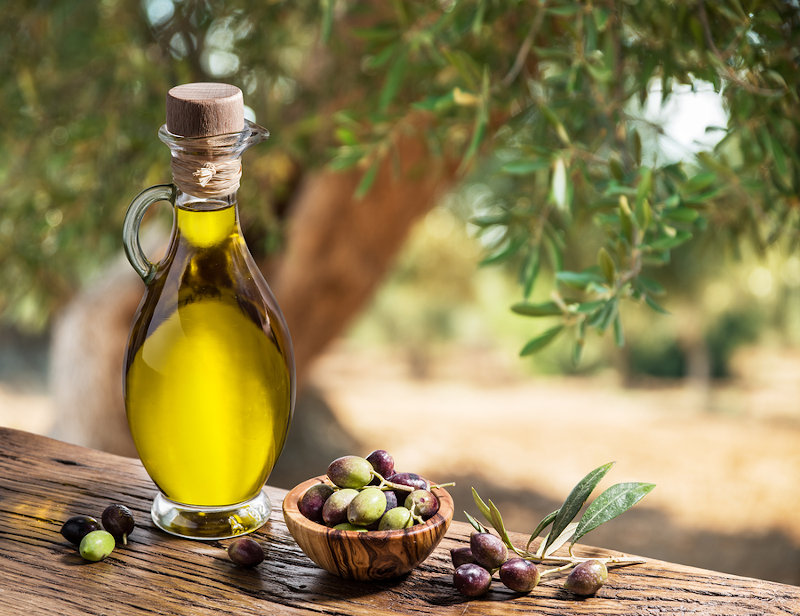
Fat Type: Mostly monounsaturated fats
How Much to Eat: 2 tablespoons
While we always encourage people to go for whole food sources when possible, we can’t deny the health benefits of olive oil. Like whole olives, this lightly refined oil is packed with oleic acid. And, of all the cooking oils, this one seems to provide the most benefits even when higher heat is involved(10).
When it comes to getting the health benefits of this oil, always opt for extra virgin olive oil or EVOO. This type of olive oil, more so than others, is packed with antioxidants and healthy fats.
A Parting Note on Fats
There are plenty of high-quality fat sources available to people following a vegan diet. The whole-food and moderately refined options we outlined above are great options for including in your daily routine.
But remember, the key to optimal health is to indulge in all the great macronutrients nature has to offer, so leave plenty of room for carbohydrates and protein to create a healthy, balanced diet.

